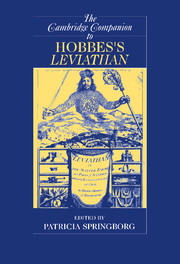Book contents
- Frontmatter
- General Introduction
- Part I: Of Man
- 1 Thomas Hobbes’s Visual Strategies
- 2 Leviathan, the Beast of Myth: Medusa, Dionysos, and the Riddle of Hobbes’s Sovereign Monster
- 3 Sense and Nonsense about Sense: Hobbes and the Aristotelians on Sense Perception and Imagination
- 4 Hobbes on the Natural Condition of Mankind
- 5 Hobbes’s Moral Philosophy
- Part II: Of Commonwealth
- Part III: Of a Christian Commonwealth
- Part IV: Of the Kingdom of Darkness
- Part V: Hobbes’s Reception
- Bibliography
- Index
- Series List
3 - Sense and Nonsense about Sense: Hobbes and the Aristotelians on Sense Perception and Imagination
from Part I: - Of Man
Published online by Cambridge University Press: 28 November 2007
- Frontmatter
- General Introduction
- Part I: Of Man
- 1 Thomas Hobbes’s Visual Strategies
- 2 Leviathan, the Beast of Myth: Medusa, Dionysos, and the Riddle of Hobbes’s Sovereign Monster
- 3 Sense and Nonsense about Sense: Hobbes and the Aristotelians on Sense Perception and Imagination
- 4 Hobbes on the Natural Condition of Mankind
- 5 Hobbes’s Moral Philosophy
- Part II: Of Commonwealth
- Part III: Of a Christian Commonwealth
- Part IV: Of the Kingdom of Darkness
- Part V: Hobbes’s Reception
- Bibliography
- Index
- Series List
Summary
INTRODUCTION
The contemporary, uninitiated reader perusing the main text of Leviathan is in for quite a surprise: this classic of political philosophy does not begin with a discussion of sovereignty, political laws, the concept of society or other issues contemporary political philosophers get excited about. Quite the contrary, Hobbes commences his work with the genesis and function of sense perception, a topic that contemporary philosophers of whatever denomination would not even dare to touch upon anymore, leaving it safely in the hands of the scientists. An even more striking trait of the first two chapters of Leviathan is that they are so fiercely polemical. Aristotelian philosophy, the so-called philosophy of the 'schools', is accused of 'insignificant speech', 'absurd doctrines' and other intellectual sins. One wonders, why this unusually impolitic start, why these polemics?
This chapter is an attempt to answer these questions, especially the second one. We will reconstruct Hobbes's debate with the Aristotelians on sense perception and the political agenda that underlies it. However, before we can embark on answering these questions we have first to get at least a rough idea of the Aristotelian doctrine Hobbes so vehemently attacked. The first section of this chapter is therefore devoted to a necessarily brief and rather general overview of the Aristotelian position on sense perception and imagination.
- Type
- Chapter
- Information
- The Cambridge Companion to Hobbes's Leviathan , pp. 82 - 108Publisher: Cambridge University PressPrint publication year: 2007
- 25
- Cited by

